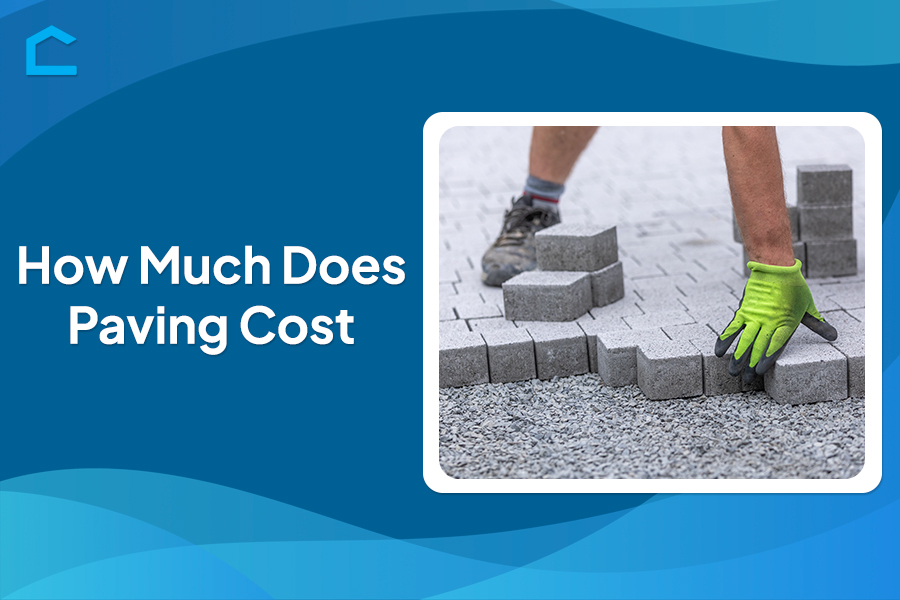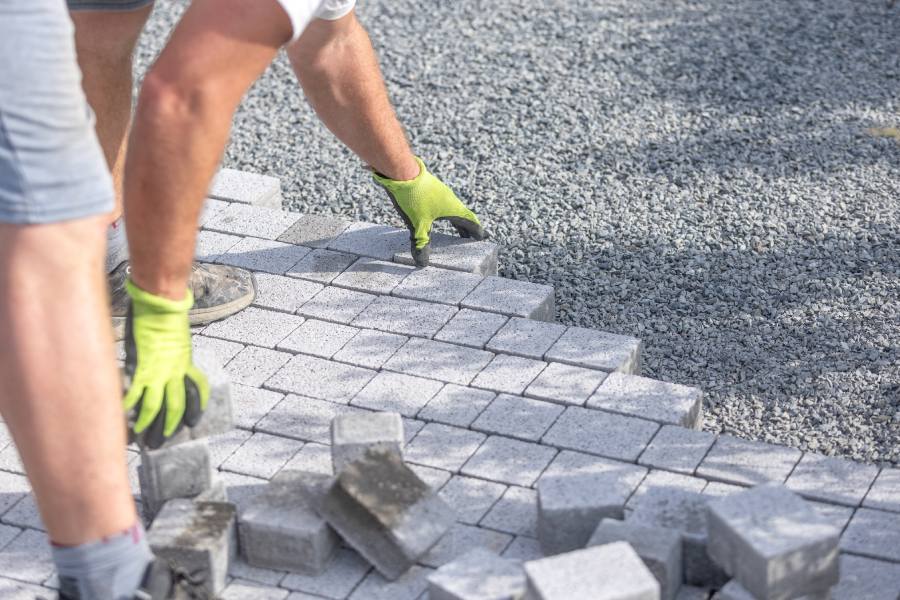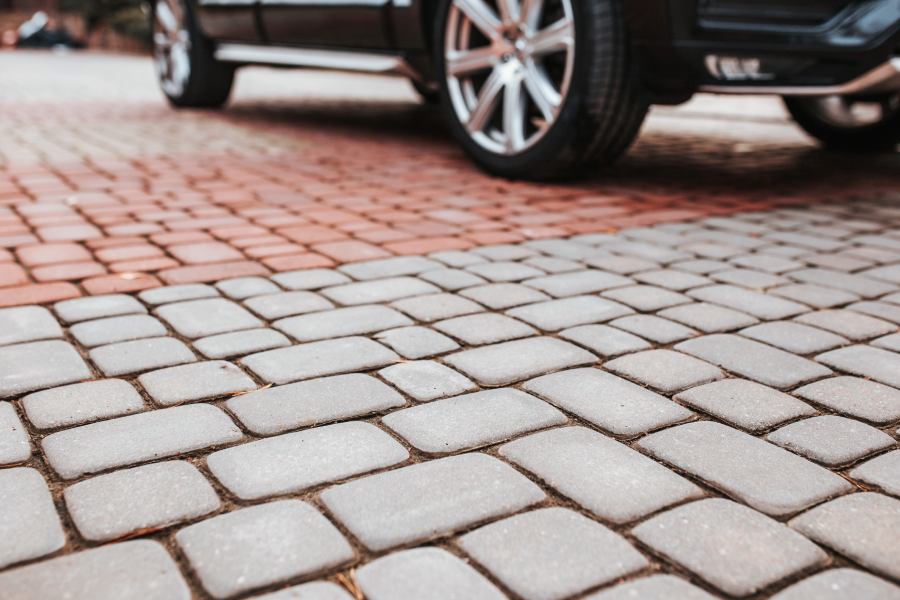How Much Does Paving Cost?

The decision to undertake a paving project represents a significant investment. Proper planning and research are essential before breaking ground on any paving work. Understanding cost factors is crucial to revamping a tired driveway, creating an elegant patio space, or laying new garden pathways. So, how much does paving cost?
In this article, we will discuss the various factors that influence paving costs and provide a clearer understanding of what to expect when planning your project. Several key considerations, from the type of materials to the size of the area, can affect the overall cost.
By exploring these elements, we aim to help you make more informed decisions and ensure your project stays within budget. Let’s discover more!

How Much Does Paving Cost?
Paving, which involves installing durable outdoor surfaces like concrete, stone, or brick, provides a solid foundation for areas like driveways, patios, and walkways. The cost of paving typically ranges from $3 to $10 per square foot, depending on factors like the project’s complexity and location.
For a standard paving job, you might expect to pay around $5 to $7 per square foot on average. Larger projects can sometimes benefit from economies of scale, reducing the cost per square foot, while smaller, more intricate designs may drive the price higher.
It’s important to keep in mind that the final price can vary significantly depending on your specific project requirements. For a more accurate estimate, we advise you to consult with a paving professional who can assess the details of your site and design.
Factors influencing paving costs
The location of your property is a key factor in determining paving costs, as urban areas generally command higher prices than rural regions. Also, the size of the project plays a significant role in per-square-foot pricing, with larger projects often benefiting from economies of scale.
Other important considerations include climate, site accessibility, and the condition of the existing surface, all of which contribute to the overall pricing structure. Soil quality and preparation requirements can also substantially impact your project’s cost. For example, poor soil conditions may require additional foundation work, while sloped surfaces demand extra labor and materials for proper grading.
Finally, the complexity of the design, including any custom features like borders or inlays, will influence the final price. These factors, combined, shape the overall cost, making it important to consider each element carefully when planning your paving project.
Cost of different paving materials
Asphalt is the most economical option, with basic installation typically ranging from $2 to $5 per square foot. For those seeking more versatility, concrete offers a variety of finish options, with prices ranging from $4 to $15 per square foot, depending on the chosen decorative elements.
On the premium end of the spectrum, natural stone pavers command prices between $15 and $50 per square foot, reflecting their durability and aesthetic appeal. Brick pavers provide a middle-ground alternative, generally costing between $10 and $30 per square foot installed.
For homeowners interested in environmentally friendly options, permeable pavers designed to improve drainage typically cost between $15 and $30 per square foot. Each material has unique benefits and maintenance needs, which should be carefully considered.
Labor and installation costs
Professional installation often constitutes 40-60% of the total project cost. Skilled labor rates vary by region, typically from $50 to $100 per hour for experienced paving contractors. The complexity of the installation, such as intricate pattern designs or custom features, can also impact labor costs.
In addition to labor, equipment costs, including machinery rental and specialized tools, are generally incorporated into the overall labor charges. Most contractors prefer calculating labor costs per square foot rather than hourly rates, with prices typically ranging from $2 to $8 per square foot. The final cost largely depends on the material chosen and the complexity of the installation.
Additional costs to consider
When budgeting for your project, you need to account for site preparation costs, which can include excavation and grading. These expenses typically add between $2 and $6 per square foot to the overall cost.
Additionally, drainage solutions are crucial for effective water management. Depending on the system’s complexity and specific site conditions, they may require an investment of $1,000 to $5,000.
Another often-overlooked expense is permits, which can vary from $100 to $500 based on your location and the project scope. For instance, you may need a permit for pavers if they’re being installed on driveways, walkways, or patios, depending on local regulations. It’s important to include these in your initial budget to avoid unexpected costs.
Moreover, regular maintenance, such as sealing every 3 to 5 years, typically costs between $0.50 and $2 per square foot. Including these ongoing maintenance costs in your long-term budget will help ensure the longevity of your project.
Cost to Resurface Asphalt Driveway
Resurfacing an asphalt driveway typically costs between $3 and $7 per square foot. This process involves applying a fresh asphalt layer over the existing surface, offering a more cost-effective solution than a complete replacement.
Incorporating creative driveway paving ideas, like adding borders or patterned sections, can enhance your driveway’s appearance and curb appeal during resurfacing.
For those considering pavers instead of asphalt, rest assured that you can drive on pavers if they are installed properly and on a stable base, making them a durable alternative for driveways.
The project’s overall cost depends on factors such as the size of the driveway, the extent of existing damage, and the required preparation work. Ideally, the best time to resurface your driveway is when it shows signs of minor wear before significant damage develops.
Contractors generally recommend resurfacing every 8 to 12 years to maintain its condition. Also, the local climate plays a crucial role in determining how frequently resurfacing may be needed, as weather conditions can impact the lifespan of your driveway.
How Many Paving Bricks per Square Foot
Standard paving bricks generally cover about 4.5 bricks per square foot, although this can vary depending on the size and design pattern. For more accurate planning, it’s a good idea to order an additional 10-15% of materials to account for cuts, breakage, and potential future repairs. This is especially important when working with intricate patterns like herringbone, which may require more bricks.
The size and shape of the bricks you select can also impact both your calculations and the final design. To assist in determining exact quantities, many suppliers offer brick calculators or planning tools. Plus, choosing standard-sized bricks instead of custom ones can help reduce waste and ultimately lower your overall project costs.
Does Paving Driveway Increase Home Value?
A well-designed and properly installed paved driveway can increase a home’s value by 5-10% of the total project cost. Professional appraisers consistently rate improvements to outdoor spaces, such as paved driveways, as significant home upgrades. The combination of enhanced curb appeal and improved functionality makes a newly paved driveway an attractive feature for potential buyers.
The return on investment, however, can vary depending on factors like your local real estate market and the quality of the installation. Using high-end materials and opting for professional installation typically yields higher returns than basic materials or DIY methods. And regular maintenance and proper care are essential for preserving the driveway’s value over time, ensuring it contributes to your home’s appeal and market value.

Conclusion
Understanding how much does paving cost is important for successful planning and budgeting. On average, paving typically ranges from $5 to $7 per square foot.
However, this can vary depending on factors such as material choice, project size, and complexity. For this purpose, our team at Services Curated helps homeowners navigate these decisions by thoroughly auditing and verifying the best contractors in the industry, ensuring you get the most reliable and cost-effective solutions.
Additionally, it’s important to account for extra costs like site preparation, drainage solutions, permits, and ongoing maintenance. By carefully evaluating these factors and working with trusted professionals, you can confidently embark on a project that adds lasting value and enhances your property’s appeal.
Contact us today for expert guidance and reliable contractors!
